Diary of Trooper Ion Llewellyn Idriess-Aug 1916-Part 1
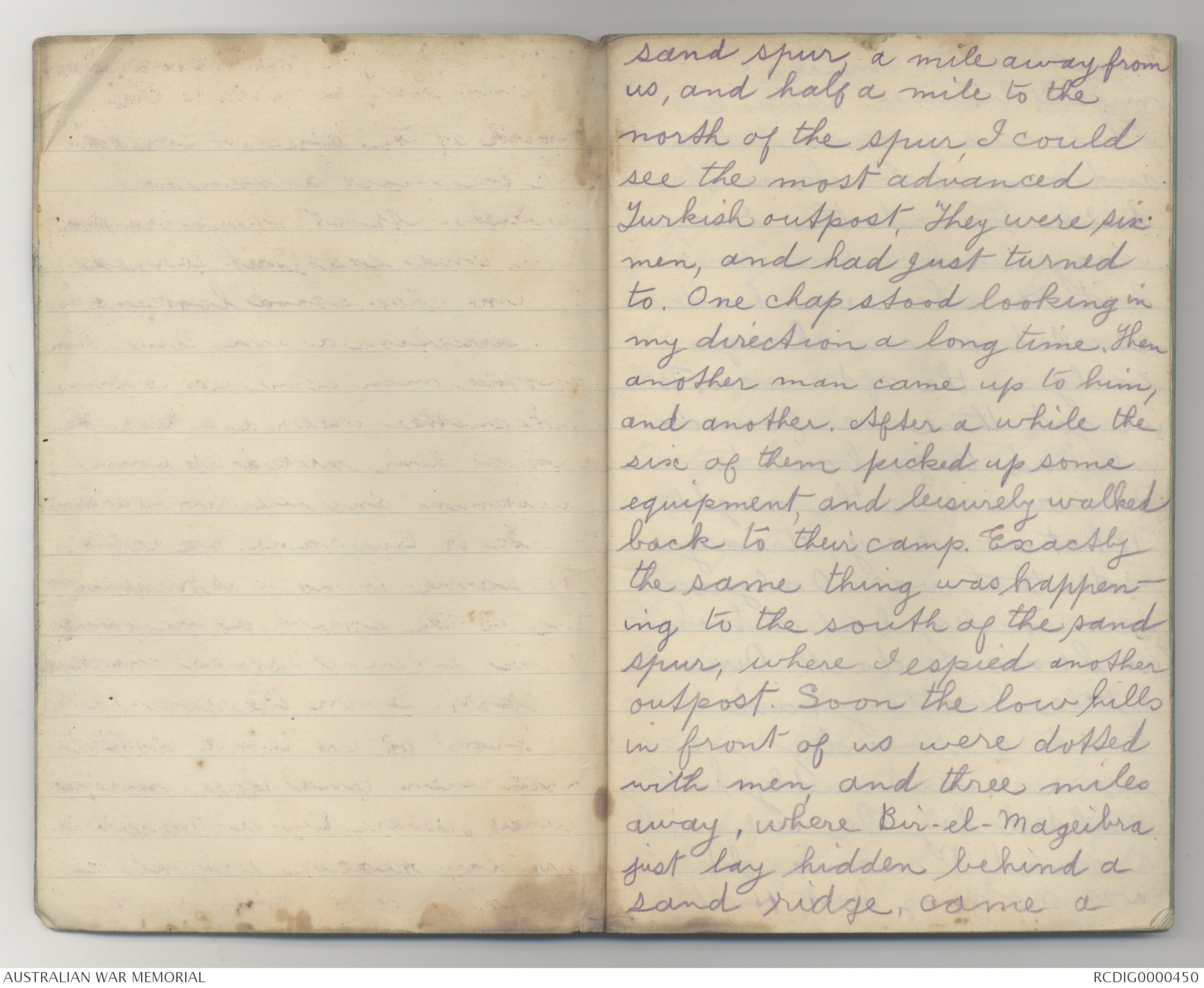
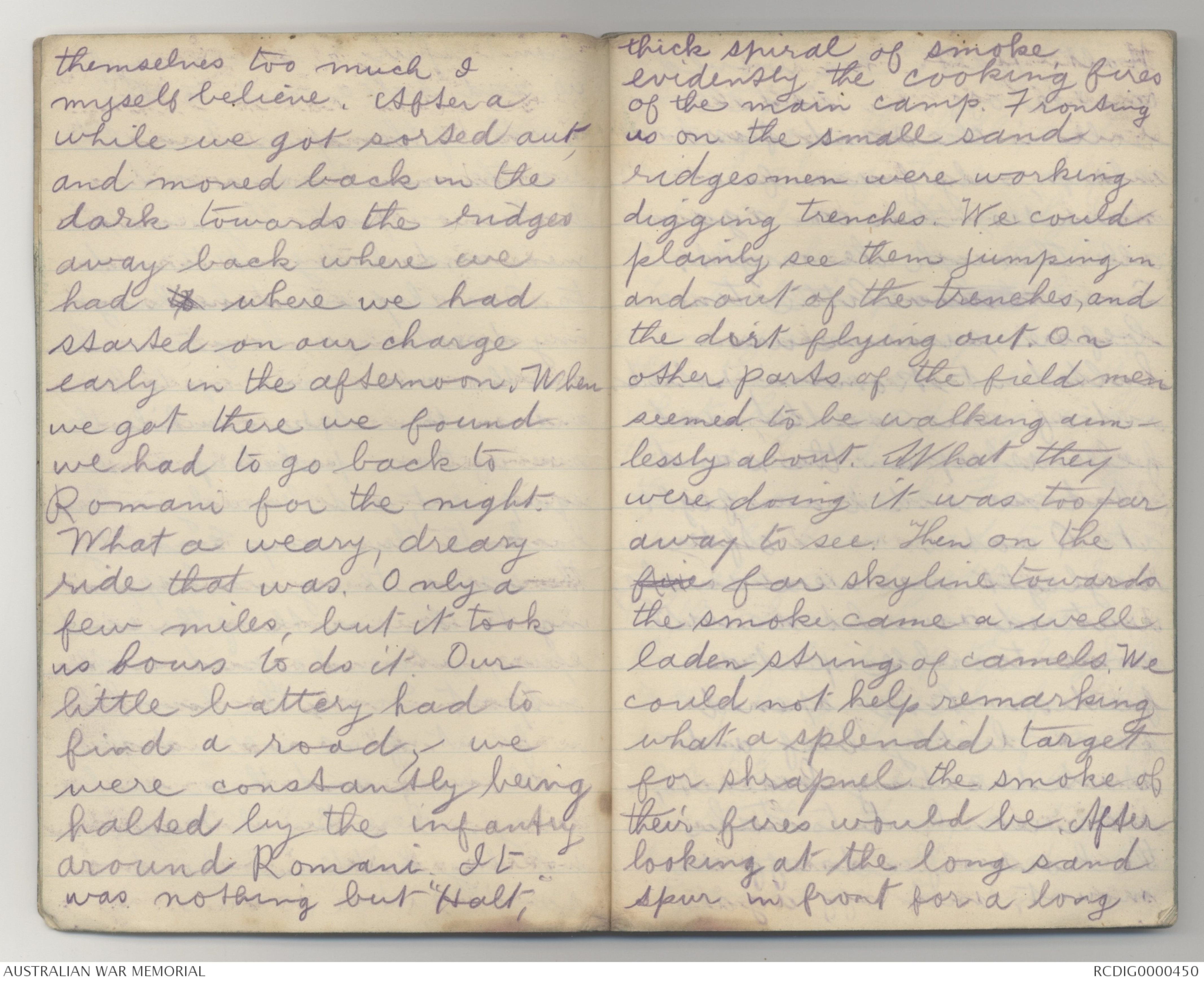
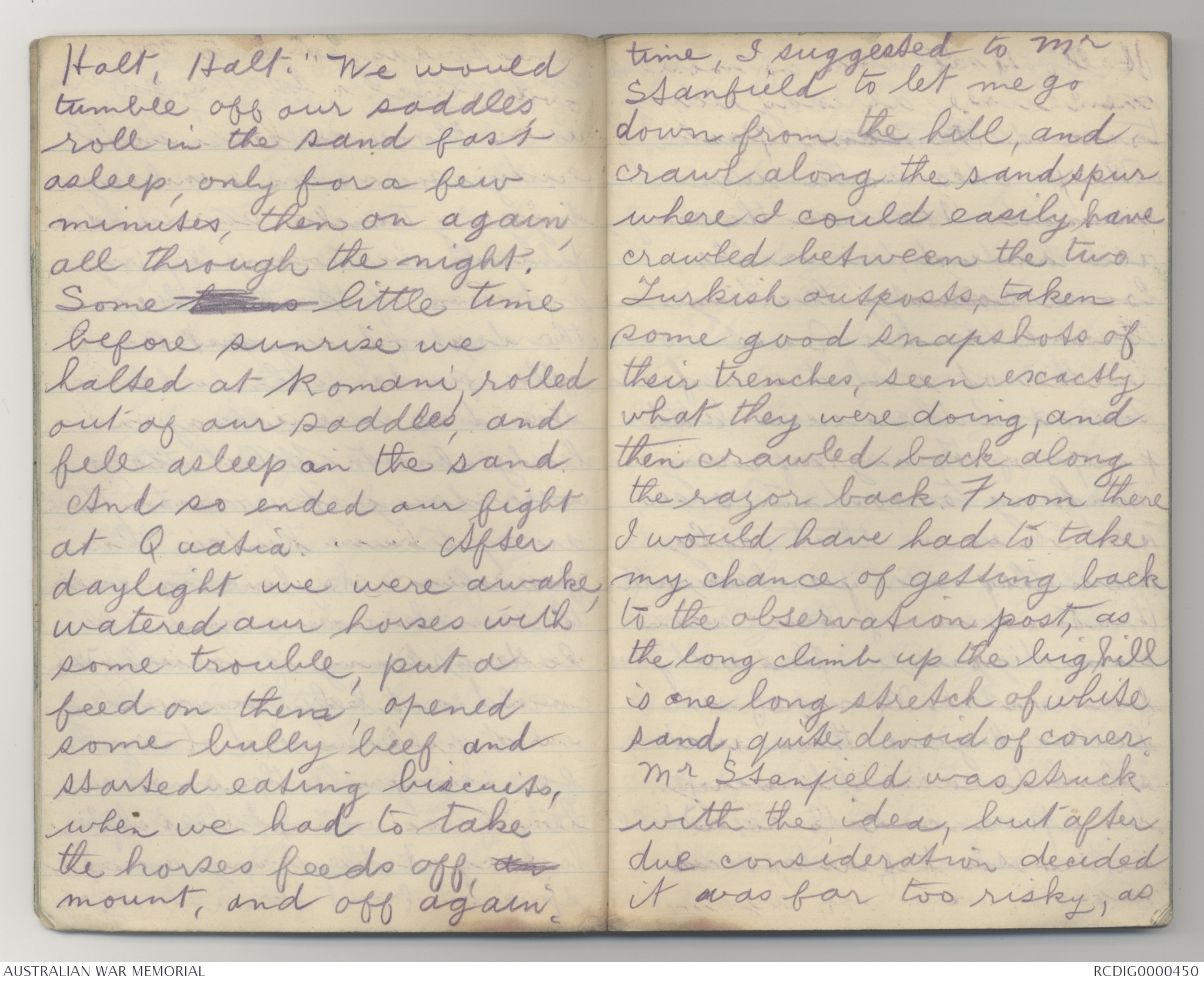
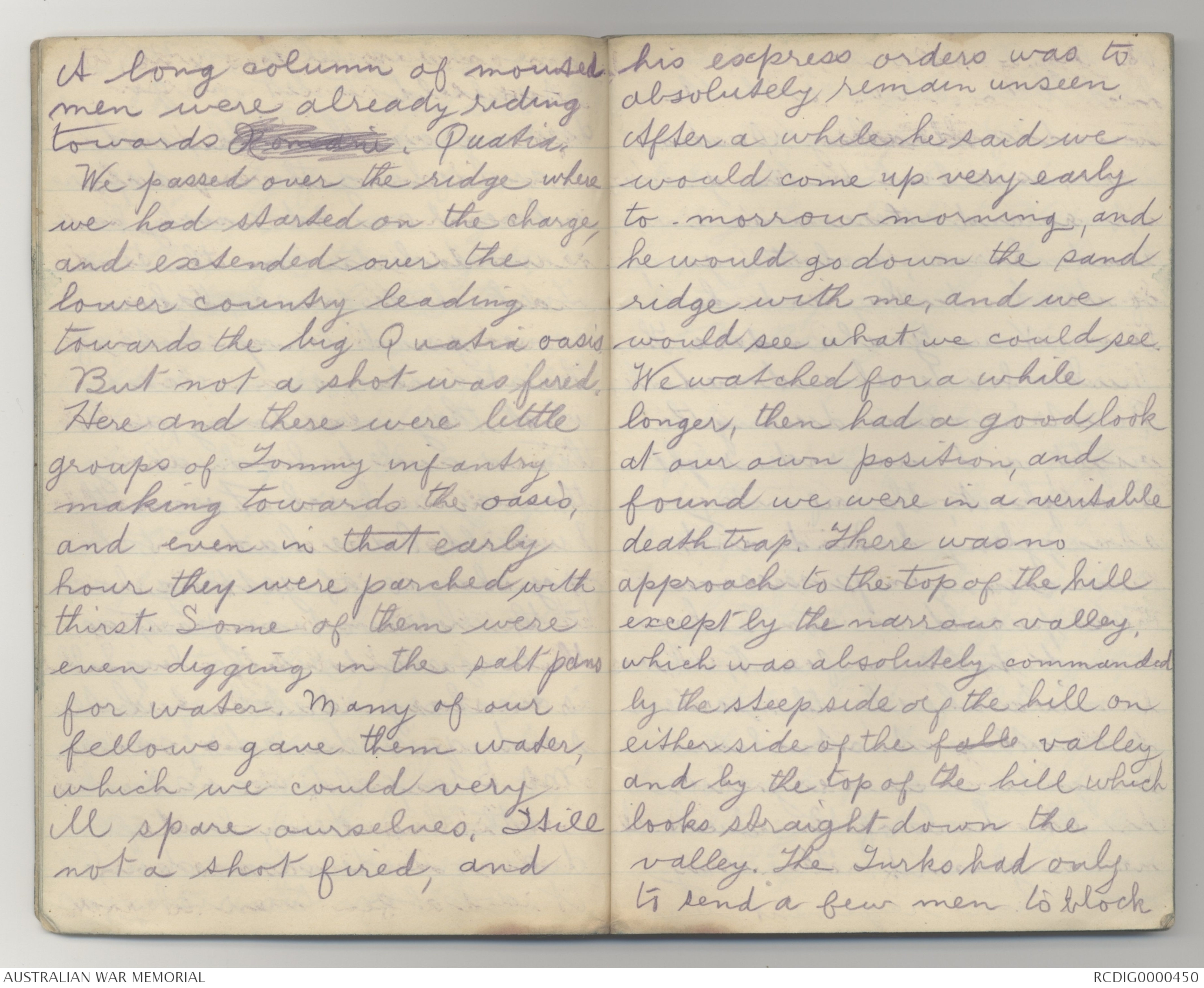
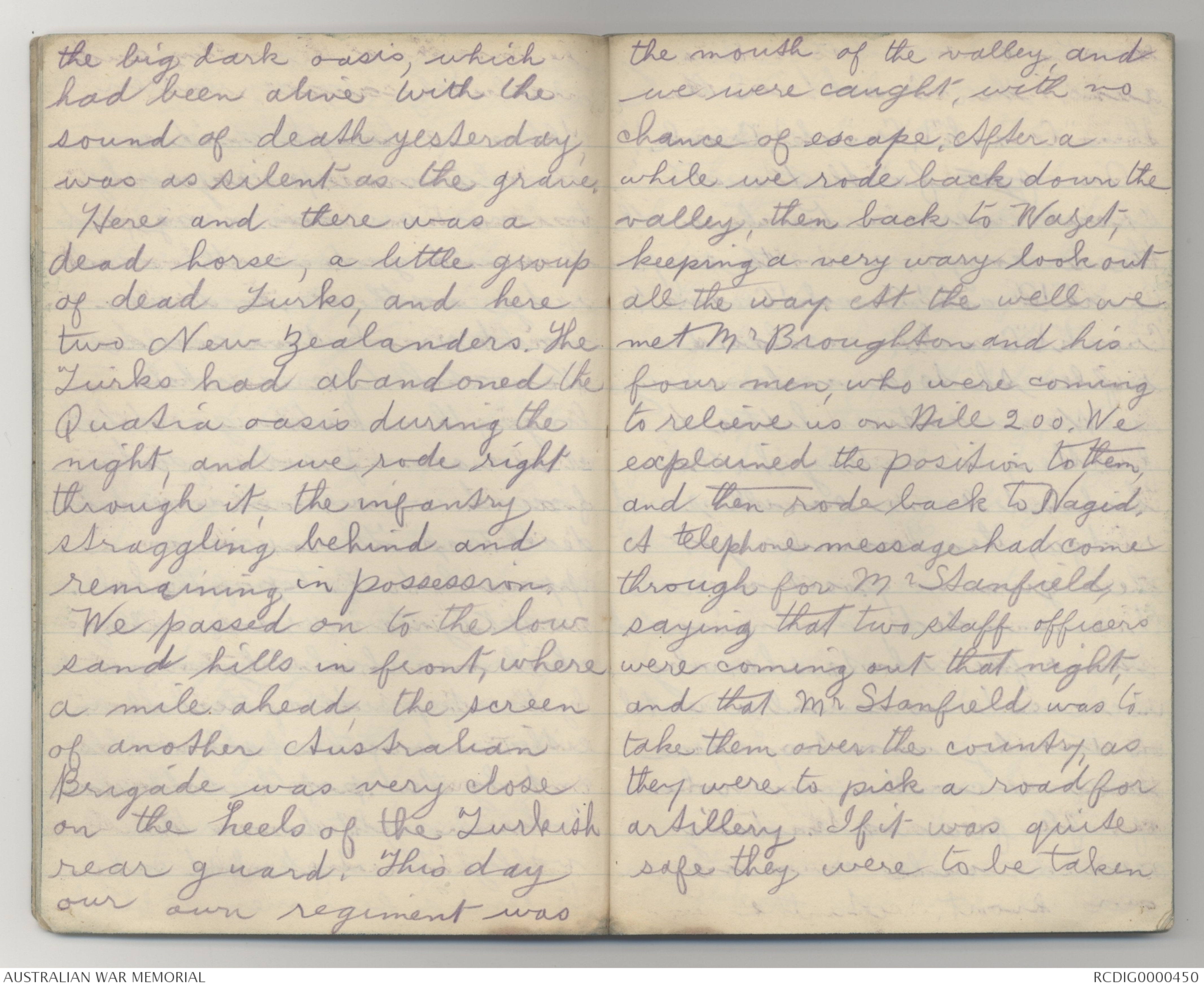
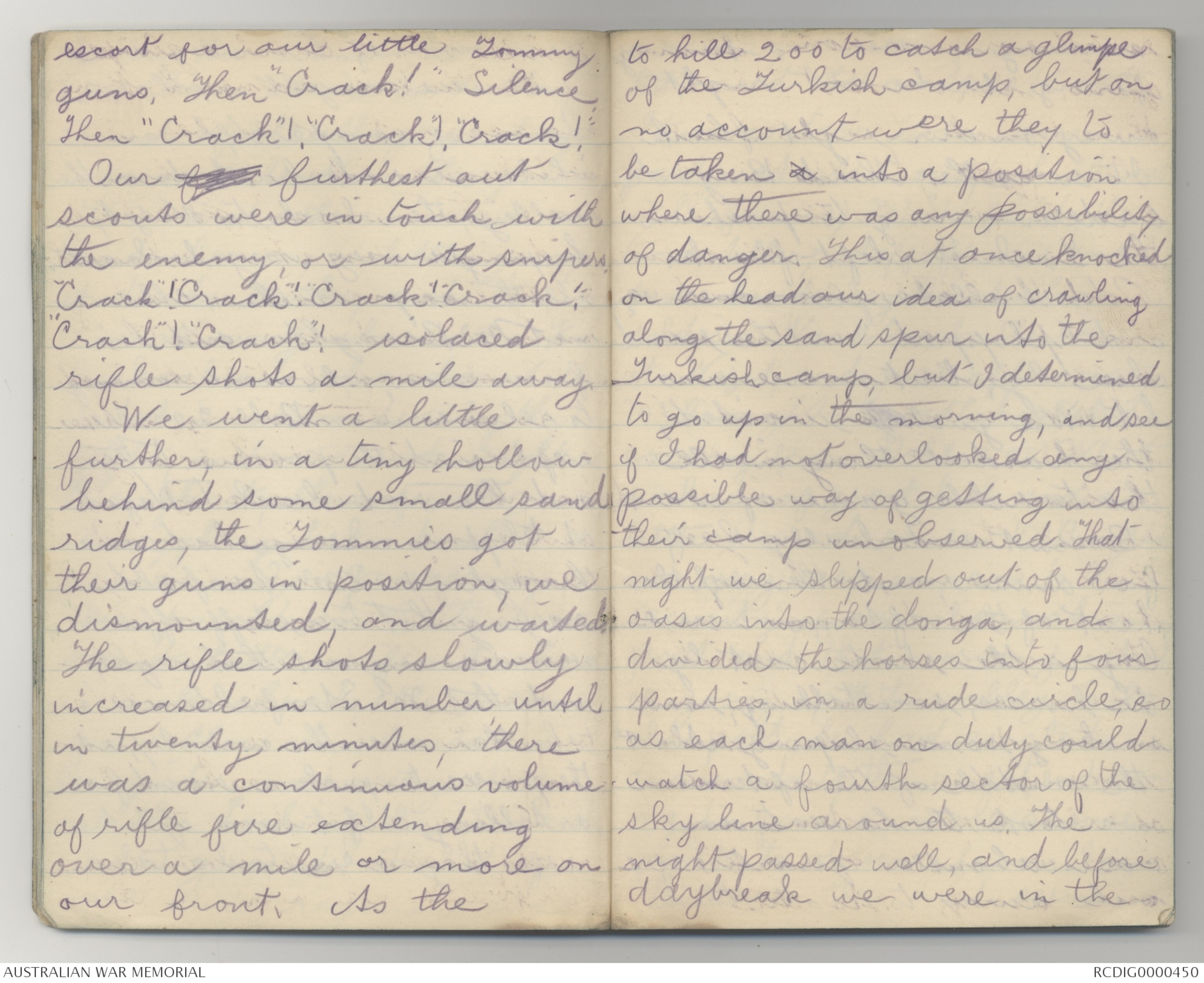
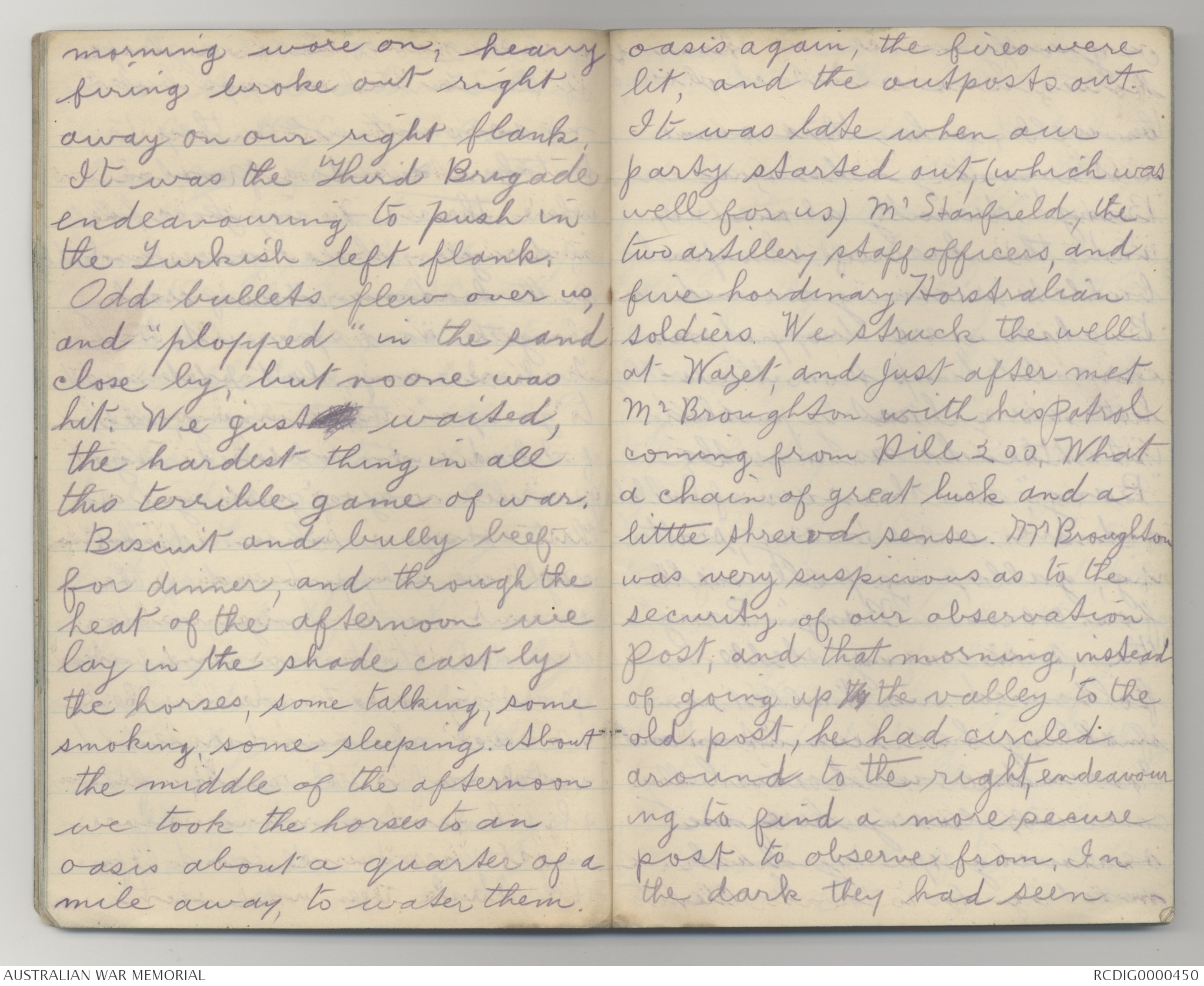
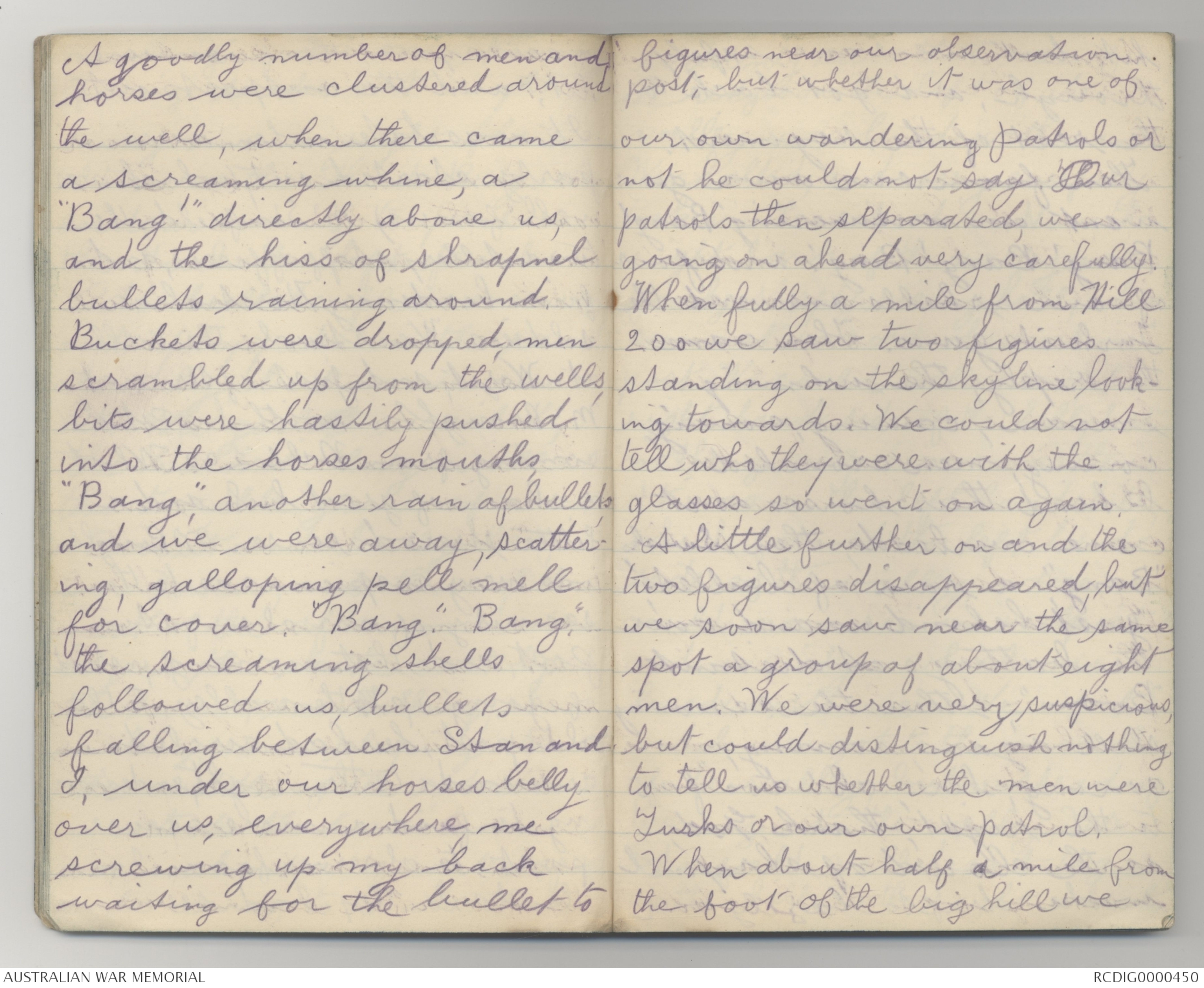
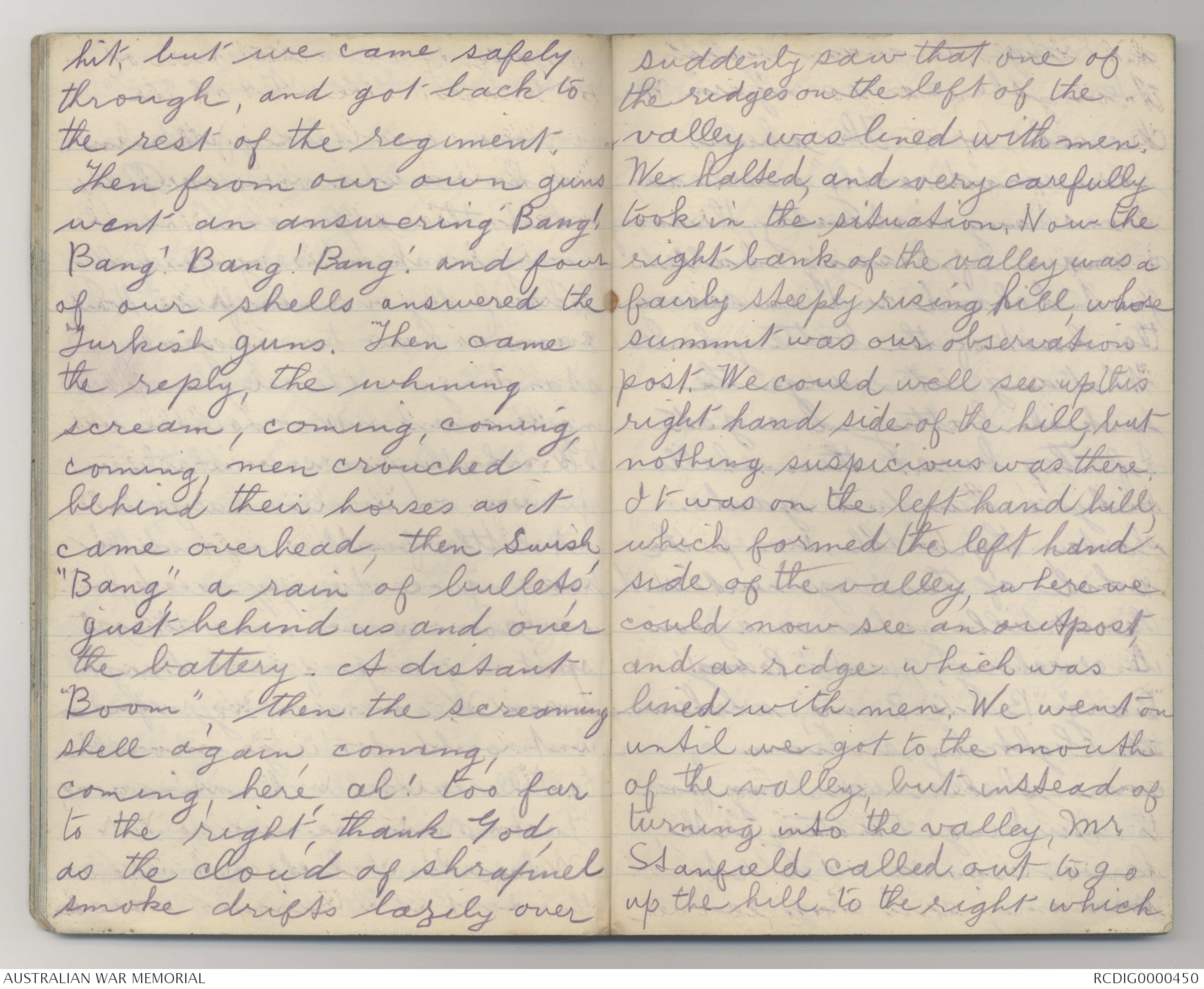
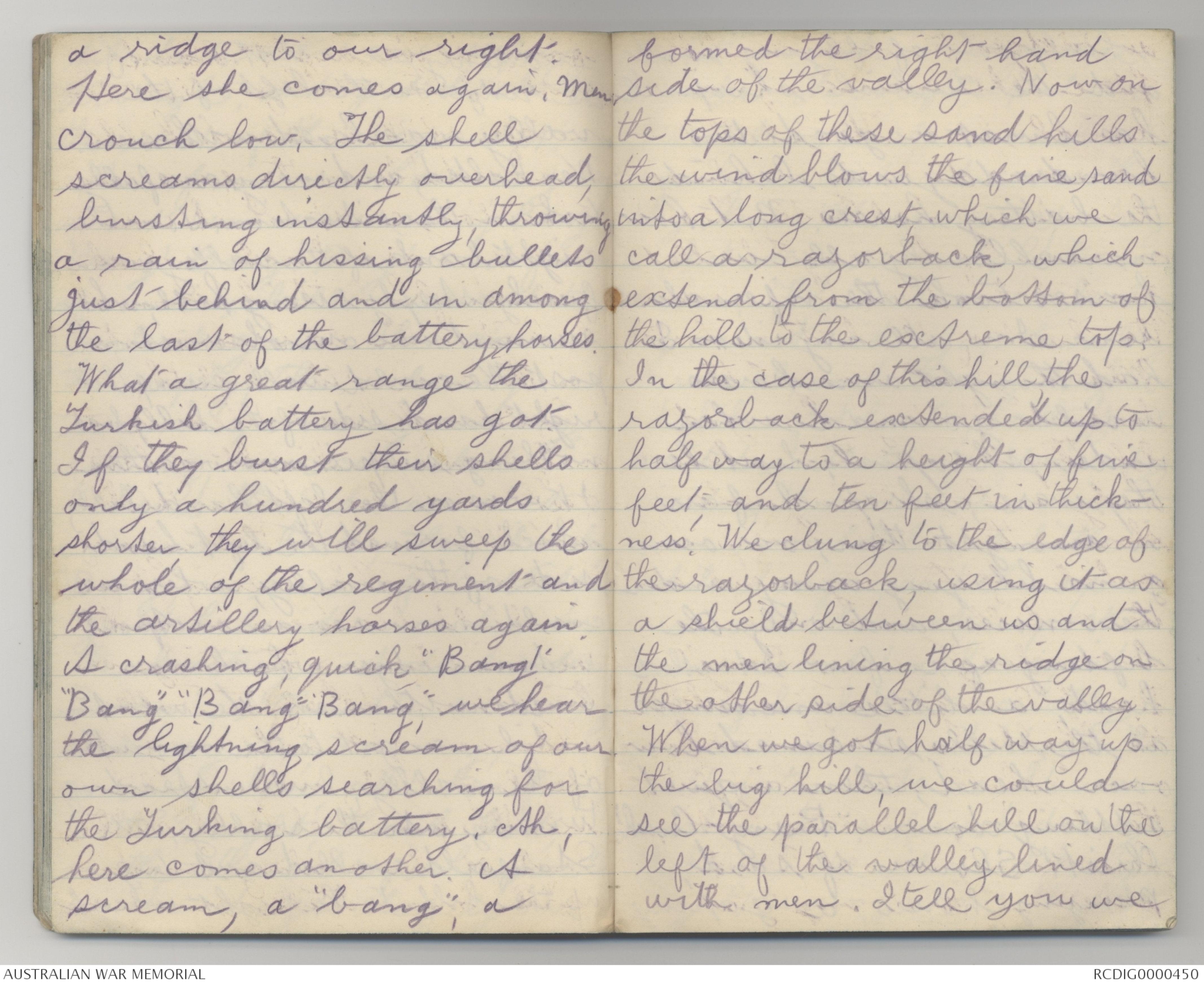
sand spur, a mile away from
us, and half a mile to the
north of the spur, I could
see the most advanced
Turkish outpost. They were six
men, and had just turned
to. One chap stood looking in
my direction a long time. Then
another man came up to him,
and another. After a while the
six of them picked up some
equipment, and leisurely walked
back to their camp. Exactly
the same thing was happening
to the south of the sand
spur, where I espied another
outpost. Soon the low hills
in front of us were dotted
with men and three miles
away, where Bir-el-Mageibra
just lay hidden behind a
sand ridge, came a
themselves too much I
myself believe. After a
while we got sorted out,
and moved back in the
dark towards the ridges
away back where we
had to where we had
started on our charge
early in the afternoon. When
we got there we found
we had to go back to
Romani for the night.
What a weary, dreary
ride that was. Only a
few miles, but it took
us hours to do it. Our
little battery had to
find a road, we
were constantly being
halted by the infantry
around Romani. It
was nothing but "Halt",
thick spiral of smoke
evidently the cooking fires
of the main camp. Fronting
us on the small sand
ridgesmen were working
digging trenches. We could
plainly see them jumping in
and out of the trenches, and
the dirt flying out. On
other parts of the field men
seemed to be walking dimlessly
about. What they
were doing it was too far
away to see. Then on the
fire far skyline towards
the smoke came a well
laden string of camels. We
could not help remarking
what a splendid target
for shrapnel the smoke of
their fires would be. After
looking at the long sand
spur in front for a long
Halt, Halt." We would
tumble off our saddles
roll in the sand fast
asleep, only for a few
minutes, then on again,
all through the night.
Some hours little time
before sunrise we
halted at Romani, rolled
out of our saddles, and
fell asleep on the sand.
And so ended our fight
at Quatia. . . . .After
daylight we were awake,
watered our horses with
some trouble, put a
feed on them, opened
some bully beef and
started eating biscuits,
when we had to take
the horses feed off, ten
mount, and off again.
time, I suggested to Mr
Stanfield to let me go
down from the hill, and
crawl along the sand spur
where I could easily have
crawled between the two
Turkish outposts, taken
some good snapshots of
their trenches, seen exactly
what they were doing, and
then crawled back along
the razor back. From there
I would have had to take
my chance of getting back
to the observation post, as
the long climb up the big hill
is one long stretch of white
sand quite devoid of cover
Mr Stanfield was struck
with the idea, but after
due consideration decided
it was far too risky, as
A long column of mounted
men were already riding
towards Romani. Quatia.
We passed over the ridge where
we had started on the charge,
and extended over the
lower country leading
towards the big Quatia oasis.
But not a shot was fired.
Here and there were little
groups of Tommy infantry,
making towards the oasis,
and even in that early
hour they were parched with
thirst. Some of them were
even digging in the salt pans
for water. Many of our
fellows gave them water,
which we could very
ill spare ourselves. Still
not a shot fired, and
his express orders was to
absolutely remain unseen.
After a while he said we
would come up very early
to-morrow morning, and
he would go down the sand
ridge with me, and we
would see what we could see.
We watched for a while
longer, then had a good look
at our own position, and
found we were in a veritable
death trap. There was no
approach to the top of the hill
except by the narrow valley,
which was absolutely commanded
by the steep side of the hill on
either side of the falle valley
and by the top of the hill which
looks straight down the
valley. The Turks had only
to send a few men to block
the big dark oasis, which
had been alive with the
sound of death yesterday,
was as silent as the grave.
Here and there was a
dead horse, a little group
of dead Turks, and here
two New Zealanders. The
Turks had abandoned the
Quatia oasis during the
night, and we rode right
through it, the infantry
struggling behind and
remaining in possession.
We passed on to the low
sand hills in front, where
a mile ahead, the screen
of another Australian
Brigade was very close
on the heels of the Turkish
rear guard. This day
our own regiment was
the mouth of the valley, and
we were caught, with no
chance of escape. After a
while we rode back down the
valley, then back to Wazet,
keeping a very wary lookout
all the way. At the well we
met Mr Broughton and his
four men, who were coming
to relieve us on Hill 200. We
explained the position to them,
and then rode back to Nagid.
A telephone message had come
through for Mr Stanfield,
saying that two staff officers
were coming out that night,
and the Mr Stanfield was to
take them over the country, as
they were to pick a road for
artillery. If it was quite
safe they were to be taken
escort for our little Tommy
guns, then "Crack!". Silence,
then "Crack"! "Crack!", "Crack!".
Our full furthest out
scouts were in touch with
the enemy, or with snipers
"Crack!", "Crack!", "Crack!", "Crack!",
"Crack!", "Crack!". isolaced
rifle shots a mile away.
We went a little
further, in a tiny hollow
behind some small sand
ridges, the Tommies got
their guns in position, we
dismounted and waited.
The rifle shots slowly
increased in number until
in twenty minutes, there
was a continuous volume
of rifle fire extending
over a mile or more on
our front. As the
to hill 200 to catch a glimpse
of the Turkish camp, but on
no account were they to
be taken a into a position
where there was any possibility
of danger. This at once knocked
on the head our idea of crawling
along the sand spur into the
Turkish camp, but I determined
to go up in the morning, and see
if I had not overlooked any
possible way of getting into
their camp unobserved. That
night we slipped out of the
oasis into the donga, and
divided the horses into four
parties, in a rude circle, so
as each man on duty could
watch a fourth sector of the
sky line around us. The
night passed well, and before
daybreak we were in the
morning wore on, heavy
firing broke out right
away on our right flank.
It was the Third Brigade
endeavouring to push in
the Turkish left flank.
Odd bullets flew over us,
and "plopped" in the sand
close by, but noone was
hit. We justed waited,
the hardest thing in all
this terrible game of war.
Biscuit and bully beef
for dinner, and through the
heat of the afternoon we
lay in the shade cast by
the horses, some talking, some
smoking, some sleeping. About
the middle of the afternoon
we took the horses to an
oasis about a quarter of a
mile away, to water them.
oasis again, the fires were
lit, and the outposts out.
It was late when our
party started out, (which was
well for us) Mr Stanfield, the
two artillery staff officers, and
five hordinary Horstralian
soldiers. We struck the well
at Wazet, and just after met
Mr Broughton with his patrol
coming from Hill 200. What
a chain of great luck and a
little shrewd sense. Mr Broughton
was very suspicious as to the
security of our observation
post, and that morning, instead
of going up to the valley to the
old post, he had circled
around to the right, endeavouring
to find a more secure
post to observe from. In
the dark they had seen
A goodly number of men and
horses were clustered around
the well, when there came
a screaming whine, a
"Bang!", directly above us,
and the hiss of shrapnel
bullets raining around.
Buckets were dropped, men
scrambled up from the wells,
bits were hastily pushed
into the horses mouths,
"Bang", another rain of bullets
and we were away, scattering,
galloping pell mell
for cover. "Bang", "Bang",
the screaming shells
followed us, bullets
falling between Stan and
I, under our horses belly
over us, everywhere, me
screwing up my back
waiting for the bullet to
figures near our observation
post, but whether it was one of
our own wandering patrols or
not he could not say. Our
patrols then separated, we
going on ahead very carefully.
When fully a mile from Hill
200 we saw two figures
standing on the skyline looking
towards. We could not
tell who they were with the
glasses so went on again.
A little further on and the
two figures disappeared, but
we soon saw near the same
spot a group of about eight
men. We were very suspicious,
but could distinguish nothing
to tell us whether the men were
Turks or our own patrol.
When about half a mile from
the foot of the big hill we
hit, but we came safely
through, and got back to
the rest of the regiment.
Then from our own guns
went an answering Bang!
Bang! Bang! Bang! and four
of our shells answered the
Turkish guns. Then came
the reply, the whining
scream, coming, coming,
coming, men crouched
behind their horses as it
came overhead, then swish,
"Bang" a rain of bullets
just behind us and over
the battery. A distant
"Boom", then the screaming
shell again, coming,
coming, here ah! too far
to the right, thank God,
as the cloud of shrapnel
smoke drifts lazily over
suddenly saw that one of
the ridges on the left of the
valley was lined with men.
We halted, and very carefully
took in the situation. Now the
right bank of the valley was a
fairly steeply rising hill, whose
summit was our observation
post. We could well see up this
right hand side of the hill, but
nothing suspicious was there.
It was on the left hand hill,
which formed the left hand
side of the valley, where we
could now see an outpost
and a ridge which was
lined with men. We went on
until we got to the mouth
of the valley, but instead of
turning into the valley, Mr
Stanfield called out to go
up the hill to the right which
a ridge to our right.
Here she comes again, Men
crouch low. The shell
screams directly overhead,
bursting instantly, throwing
a rain of hissing bullets
just behind and in among
the last of the battery horses.
What a great range the
Turkish battery has got.
If they burst their shells
only a hundred yards
shorter they will sweep the
whole of the regiment and
the artillery horses again.
A crashing quick "Bang!"
"Bang" "Bang" "Bang" we hear
the lightning scream of our
own shells searching for
the Turking battery. Ah,
here comes another it
scream, a "bang", a
formed the right hand
side of the valley. Now on
the tops of these sand hills
the wind blows the fine sand
into a long crest which we
call a razorback, which
extends from the bottom of
the hill to the extreme top.
In the case of this hill the
razorback extended up to
halfway to a height of five
feet, and ten feet in thickness!
We clung to the edge of
the razorback, using it as
a shield between us and
the men lining the ridge on
the other side of the valley.
When we got halfway up
the big hill, we could
see the parallel hill on the
left of the valley lined
with men. I tell you we
 Diane Ware
Diane WareThis transcription item is now locked to you for editing. To release the lock either Save your changes or Cancel.
This lock will be automatically released after 60 minutes of inactivity.